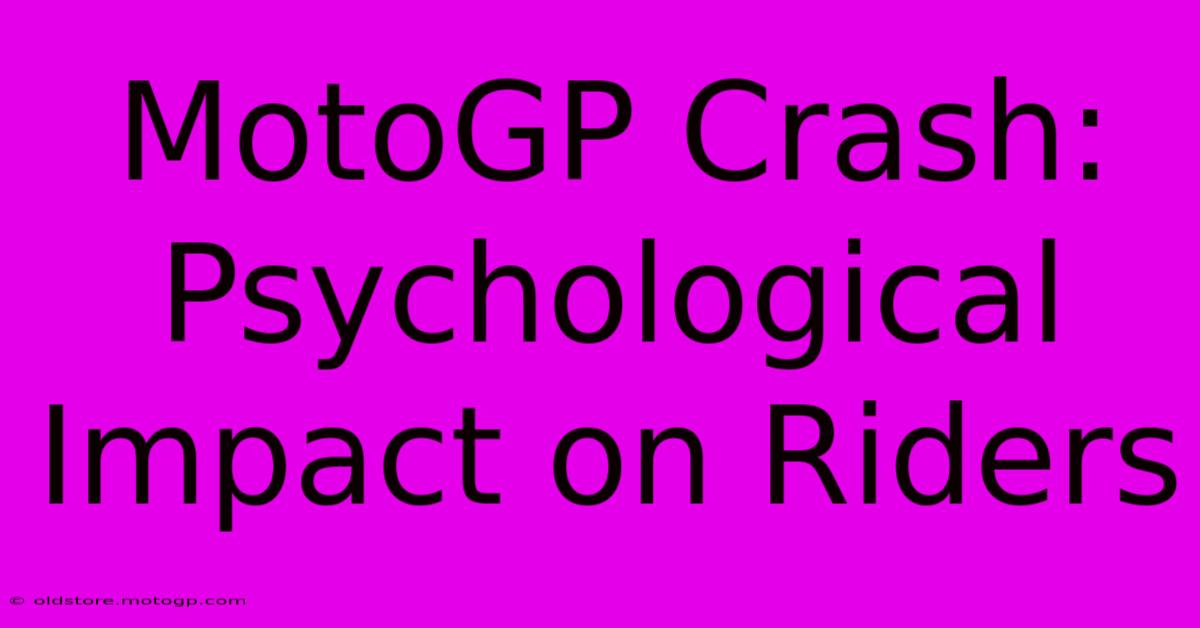MotoGP Crash: Psychological Impact On Riders

Table of Contents
MotoGP Crash: Psychological Impact on Riders
The roar of the crowd, the smell of burning rubber, the adrenaline rush – MotoGP racing is a spectacle of skill and daring. But behind the glamour and glory lies a harsh reality: the ever-present risk of crashes. While physical injuries are a major concern, the psychological impact of these crashes on riders is often overlooked, yet equally significant. This article delves into the mental and emotional toll that crashes take on MotoGP riders, exploring the challenges they face and the strategies they employ to overcome them.
The Immediate Aftermath: Shock and Fear
A high-speed crash in MotoGP isn't just a physical event; it's a traumatic experience. The immediate aftermath is often characterized by shock and fear. The intense physical pain is compounded by the adrenaline dump, leaving riders vulnerable to feelings of disorientation, confusion, and anxiety. The sheer force of the impact can lead to concussion and other head injuries, further exacerbating the psychological effects. Even without visible physical injuries, the emotional trauma can be profound. The experience can trigger a fight-or-flight response, leading to heightened alertness, irritability, and difficulty sleeping.
The Psychological Scars: Beyond the Bruises
The psychological consequences extend far beyond the immediate aftermath. Many riders struggle with Post-Traumatic Stress Disorder (PTSD), experiencing flashbacks, nightmares, and intense anxiety related to racing. The fear of another crash can become debilitating, impacting their confidence and performance on the track. This fear of failure can be particularly challenging, leading to hesitation and a reluctance to push their limits – a crucial aspect of competitive MotoGP racing.
Common Psychological Impacts:
- Anxiety and Depression: The constant pressure, risk of injury, and public scrutiny can take a significant toll on mental health.
- Loss of Confidence: A severe crash can significantly damage a rider's self-belief and confidence in their abilities.
- Sleep Disturbances: Nightmares, insomnia, and difficulty relaxing are common experiences.
- Relationship Difficulties: The stress and emotional burden can affect personal relationships.
Coping Mechanisms and Support Systems
Fortunately, MotoGP riders have access to extensive support systems designed to help them cope with the psychological challenges of the sport. Sports psychologists play a vital role, providing counseling, cognitive behavioral therapy (CBT), and other techniques to help riders manage anxiety, fear, and PTSD. These professionals help riders develop coping strategies, such as mindfulness techniques, visualization exercises, and stress management programs.
The Importance of Team Support
The rider's team also plays a crucial role in their recovery. A supportive team environment can provide a sense of security and reassurance, helping riders feel comfortable discussing their fears and concerns. Open communication and empathy are essential in creating a safe and nurturing space for emotional healing.
Strategies Employed by Riders:
- Mindfulness and Meditation: Techniques to help manage anxiety and focus on the present moment.
- Visualization: Mental rehearsal of successful races to build confidence and reduce fear.
- Cognitive Behavioral Therapy (CBT): Techniques to identify and challenge negative thought patterns.
- Physical Therapy: Rebuilding physical strength and confidence after injury.
The Long Road to Recovery
The recovery process after a significant crash can be long and challenging. It's not just about physical rehabilitation; it's also about mental and emotional healing. Some riders may require months, or even years, to fully recover their confidence and return to their pre-crash performance level. Patience, perseverance, and access to appropriate support are key factors in a successful recovery. The journey back to the track is a testament to their resilience and determination.
Keywords: MotoGP, Crash, Psychological Impact, Riders, PTSD, Anxiety, Depression, Fear, Recovery, Mental Health, Sports Psychology, Support Systems, Concussion, Trauma
This article aims to raise awareness of the psychological challenges faced by MotoGP riders, highlighting the importance of mental health support within the sport. It's crucial to remember that behind the helmets and leather suits are human beings who experience a wide range of emotions and challenges. By understanding and addressing these issues, we can create a more supportive and sustainable environment for these incredible athletes.

Thank you for visiting our website wich cover about MotoGP Crash: Psychological Impact On Riders. We hope the information provided has been useful to you. Feel free to contact us if you have any questions or need further assistance. See you next time and dont miss to bookmark.
Featured Posts
-
Cota Grounds Pass The Perfect Gift For Racing Fans
Feb 20, 2025
-
Moto Gp Crash Rider Safety Improvements
Feb 20, 2025
-
Moto Gp Top Speed The Ultimate Racing Machine
Feb 20, 2025
-
F1 Us Grand Prix Tv Coverage Pre Race Live And Post Race Action
Feb 20, 2025
-
Us Gp Concerts Unleash Your Inner Rockstar
Feb 20, 2025
